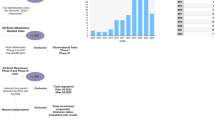Abstract
Brain metastases natural history from one primary tumor type might be accelerated or favored by using certain systemic chemotherapy. A great deal was described in mice and suggested in human with antiangiogenic drugs, but little is known about the metastatic progression generated by the perverse effect of anticancer drugs. A total of 413 patients who underwent treatment for brain metastasis (2013–2016) were included. The identification of all previous anticancer drugs received by patients from primary tumor diagnosis to brain metastases diagnosis was collated. The median value for the time of first appearance of brain metastasis in all patients was 13.1 months (SD 1.77). The values of brain metastasis-free survival (bMFS) for each primary cancer were: 50.9 months (SD 8.8) for breast, 28.5 months (SD 11.4) for digestive, 27.7 months (SD 18.3) for melanoma, 12.3 months (SD 8.3) for kidney, 1.5 months (SD 0.1) for lung and 26.9 months (SD 18.3) for others (p < 0.009). Through Cox multivariate proportional hazard model, we identified that the only independent factors associated with short bMFS were: lung primary tumor [odd ratio (OR) 0.234, CI 95% 0.16–0.42; p < 0.0001] and mitotic spindle inhibitor (taxanes) chemotherapy [OR 0.609, CI 95% 0.50–0.93; p < 0.001]. Contrariwise, breast primary tumor [odd ratio (OR) 2.372, CI 95% 1.29–4.3; p < 0.005] was an independent factor that proved a significantly longer bMFS. We suggest that anticancer drugs, especially taxane and its derivatives, could promote brain metastases, decreasing free survival. Mechanisms are discussed but still need to be determined.


Similar content being viewed by others
References
Jemal A, Siegel R, Ward E, Hao Y, Xu J, Murray T, Thun MJ. Cancer statistics. CA Cancer J Clin. 2008;58:71–96.
Zimm S, Wampler GL, Stablein D, Hazra T, Young HF. Intracerebral metastases in solid-tumor patients: natural history and results of treatment. Cancer. 1981;48:384–94.
Posner JB. Neurologic complications of cancer. Philadelphia: FA Davies; 1995.
Barnholtz-Sloan J, Sloan A, Davis F, Vigneau F, Lai P, Sawaya RE. Incidence proportions of brain metastases in patients diagnosed (1973 to 2001) in the Metropolitan Detroit Cancer Surveillance System. J Clin Oncol. 2004;22(14):2865–72.
Gupta G, Massague J. Cancer metastasis: building a framework. Cell. 2006;127:679–95.
von Essen CF. Radiation enhancement of metastasis: a review. Clin Exp Metastasis. 1991;9:77–104.
Kargiotis O, Geka A, Rao JS, Kyritsis AP. Effects of irradiation on tumor cell survival, invasion and angiogenesis. J Neurooncol. 2010;100:323–38.
Pàez-Ribes M, Allen E, Hudock J, Takeda T, Okuyama H, Viñals F, et al. Antiangiogenic therapy elicits malignant progression of tumors to increased local invasion and distant metastasis. Cancer Cell. 2009;15:220–31.
Ebos JM, Lee CR, Cruz-Munoz W, Bjarnason GA, Christensen JG, Kerbel RS. Accelerated metastasis after short-term treatment with a potent inhibitor of tumor angiogenesis. Cancer Cell. 2009;15:232–9.
Gaspar L, Scott C, Rotman M, Asbell S, Phillips T, Wasserman T, et al. Recursive partitioning analysis (RPA) of prognostic factors in three Radiation Therapy Oncology Group (RTOG) brain metastases trials. Int J Radiat Oncol Biol Phys. 1997;37(4):745–51.
Sperduto PW, Chao ST, Sneed PK, Luo X, Suh J, Roberge D, et al. Diagnosis-specific prognostic factors, indexes, and treatment outcomes for patients with newly diagnosed brain metastases: a multi-institutional analysis of 4,259 patients. Int J Radiat Oncol Biol Phys. 2010;77(3):655–61. https://doi.org/10.1016/j.ijrobp.2009.08.025 Epub 2009 Nov 26.
Sperduto PW, Kased N, Roberge D, Xu Z, Shanley R, Luo X, et al. Summary report on the graded prognostic assessment: an accurate and facile diagnosis-specific tool to estimate survival for patients with brain metastases. J Clin Oncol. 2012;30(4):419–25. https://doi.org/10.1200/JCO.2011.38.0527 Epub 2011 Dec 27.
Krewski D, Rao JNK. Inference from stratified samples: properties of the linearization, jackknife and balanced repeated replication methods. Ann Stat. 1981;9:1010–9.
Niwińska A, Rudnicka H, Murawska M. Breast cancer leptomeningeal metastasis: propensity of breast cancer subtypes for leptomeninges and the analysis of factors influencing survival. Med Oncol. 2013;30(1):408. https://doi.org/10.1007/s12032-012-0408-4 Epub 2013 Jan 16.
Enders F, Geisenberger C, Jungk C, Bermejo JL, Warta R, von Deimling A, et al. Prognostic factors and long-term survival in surgically treated brain metastases from non-small cell lung cancer. Clin Neurol Neurosurg. 2016;142:72–80. https://doi.org/10.1016/j.clineuro.2016.01.011 Epub 2016 Jan 14.
Amelot A, Terrier LM, Mazeron JJ, Valery CA, Cornu P, Carpentier A, et al. Timeline metastatic progression: in the wake of the « seed and soil » theory. Med Oncol. 2017;34(11):185. https://doi.org/10.1007/s12032-017-1045-8.
Niwińska A. Brain metastases as site of first and isolated recurrence of breast cancer: the role of systemic therapy after local treatment. Clin Exp Metastasis. 2016;33(7):677–85. https://doi.org/10.1007/s10585-016-9802-1 Epub 2016 May 25.
Longley DB, Johnston PG. Molecular mechanisms of drug resistance. J Pathol. 2005;205:275–92.
Paget S. The distribution of secondary growths in cancer of the breast. Lancet. 1889;133:571–3.
Fidler I. The biology of brain metastasis: challenges for therapy. Cancer J. 2015;21(4):284–93. https://doi.org/10.1097/PPO.0000000000000126.
Cairns RA, Hill RP. Acute hypoxia enhances spontaneous lymph node metastasis in an orthotopic murine model of human cervical carcinoma. Cancer Res. 2004;64:2054–61.
Cairns RA, Kalliomaki T, Hill RP. Acute (cyclic) hypoxia enhances spontaneous metastasis of KHT murine tumors. Cancer Res. 2001;61:8903–8.
Casanovas O, Hicklin DJ, Bergers G, Hanahan D. Drug resistance by evasion of antiangiogenic targeting of VEGF signaling in late-stage pancreatic islet tumors. Cancer Cell. 2005;8:299–309.
Saidi A, Hagedorn M, Allain N, Verpelli C, Sala C, Bello L, et al. Combined targeting of interleukin-6 and vascular endothelial growth factor potently inhibits glioma growth and invasiveness. Int J Cancer. 2009;125:1054–64.
Rofstad EK, Halsør EF. Hypoxia-associated spontaneous pulmonary metastasis in human melanoma xenografts: involvement of microvascular hot spots induced in hypoxic foci by interleukin 8. Br J Cancer. 2002;86:301–8.
Rofstad EK, Rasmussen H, Galappathi K, Mathiesen B, Nilsen K, Graff BA. Hypoxia promotes lymph node metastasis in human melanoma xenografts by up-regulating the urokinase-type plasminogen activator receptor. Cancer Res. 2002;62:1847–53.
Heath VL, Bicknell R. Anticancer strategies involving the vasculature. Nat Rev Clin Oncol. 2009;6:395–404.
Gingis-Velitski S, Loven D, Benayoun L, Munster M, Bril R, Voloshin T, et al. Host response to short-term, single-agent chemotherapy induces matrix metalloproteinase-9 expression and accelerates metastasis in mice. Cancer Res. 2011;71:6986–96.
Shree T, Olson O, Elie B, Kester J, Garfall A, Simpson K, et al. Macrophages and cathepsin proteases blunt chemotherapeutic response in breast cancer. Genes Dev. 2011;25:2465–79.
Timaner M, Bril R, Kaidar-Person O, Rachman-Tzemah C, Alishekevitz D, Kotsofruk R, et al. De-qualinium blocks macrophage-induced metastasis following local radiation. Oncotarget. 2015;6:27537–54.
Alishekevitz D, Gingis-Velitski S, Kaidar-Person O, Gutter-Kapon L, Scherer SD, Raviv Z, et al. Macrophage-induced lymphangiogenesis and metastasis following paclitaxel chemotherapy is regulated by VEGFR3. Cell Rep. 2016;17(5):1344–56. https://doi.org/10.1016/j.celrep.2016.09.083.
Olson EM, Abdel-Rasoul M, Maly J, Wu CS, Lin NU, Shapiro CL. Incidence and risk of central nervous system metastases as site of first recurrence in patients with HER2-positive breast cancer treated with adjuvant trastuzumab. Ann Oncol. 2013;24:1526–33.
Spielmann M, Roche H, Delozier T, Canon JL, Romieu G, Bourgeois H, et al. Trastuzumab for patients with axillary- node-positive breast cancer: results of the FNCLCC-PACS 04 trial. J Clin Oncol. 2009;27:6129–34.
Gianni L, Dafni U, Gelber RD, Azambuja E, Muehlbauer S, Goldhirsch A, et al. Treatment with trastuzumab for 1 year after adjuvant chemotherapy in patients with HER2-positive early breast cancer: a 4-year follow-up of a randomized controlled trials. Lancet Oncol. 2011;12:236–44.
Lee HH, Bellat V, Law B. Chemotherapy induces adaptive drug resistance and metastatic potentials via phenotypic CXCR4-expressing cell state transition in ovarian cancer. PLoS ONE. 2017;12(2):e0171044. https://doi.org/10.1371/journal.pone.0171044.
Funding
This study was not funded.
Author information
Authors and Affiliations
Contributions
AA, LMT, BM, CAV, AC, ML and JJM contributed to design and conceptualization of the study; AA, LMT, ARC, CAV and PC analyzed the data; AA, BM, ARC, LMT, AC, ML and JJM interpreted the data; AA, LMT, AC, ML, JJM and PC drafted the manuscript; AA, LMT, AC, ML and ARC wrote the manuscript; AA, BM, ARC, LMT, CAV, AC, ML, JJM and ARC contributed to manuscript revision for intellectual content. The guarantors, AA and ML are responsible for the overall content.
Corresponding author
Ethics declarations
Conflict of interest
AA, LMT, BM, JJM, CAV, PC, AC and ML declare that they have no conflict of interest.
Ethical approval
This article does not contain any studies with human participants or animals performed by any of the authors. Informed consent was obtained from all individual participants included in the study.
Rights and permissions
About this article
Cite this article
Amelot, A., Terrier, LM., Mathon, B. et al. Can anticancer chemotherapy promote the progression of brain metastases?. Med Oncol 35, 35 (2018). https://doi.org/10.1007/s12032-018-1097-4
Received:
Accepted:
Published:
DOI: https://doi.org/10.1007/s12032-018-1097-4




